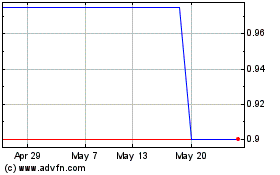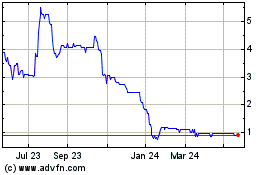German Smaller Co - Final Results
May 25 1999 - 12:59PM
UK Regulatory
RNS No 8011c
GERMAN SMALLER COMPANIES INVESTMENT TRUST PLC
25 May 1999
Statement by the Chairman
I am pleased to report that the Trust's undiluted Net
Asset Value per ordinary share has increased by 18.8% to
166.0p during the year ended 31st March 1999, while the
share price has risen by 19.3% to 134.0p In so doing, the
Trust has out performed its benchmark, the composite DAX
(exDAX) Capital Index by a very substantial margin as
this index fell by 2.1% in sterling terms over the same
period. This excellent result was largely due to the
decision taken by shareholders last year to widen the
policy of the trust enabling the fund manager to invest
in the Neuer Markt. Further reference to this
development appears below.
The German economy overall grew by 2.8% in 1998,its
highest rate of growth since reunification. It would be
misleading to conclude from this headline number however
that the economy is in fine shape. Exports maintained the
strength of the previous year into the first half of 1998
but then began to decline in response to the overall
slowdown in the global economy occasioned by the series
of financial and economic crises in Southeast Asia,
Russia and latterly, Brazil. Industrial output fell back
in the second half and in the fourth quarter of calendar
1998 investment activity came to a standstill. This
deterioration in the investment climate was exacerbated
by the change in the German political scene. A left of
centre SPD/Green coalition government under Chancellor
Schroder was formed in September 1998 following the
general election. Publication shortly thereafter of tax
reform proposals and of environmental projects penalising
the corporate sector together with backing for pay
settlements above productivity gains in key sectors of
the economy caused an outcry among employers.
Quarter on quarter growth in the last three months of
1998 actually declined by 0.4% as the slump in the
industrial sector could not be sufficiently offset by the
continued expansion in the service sector. Private
consumption remained the bright spot and became the
engine of growth from the fourth quarter. In contrast to
surveys of business confidence which fell successively
each month in 1998,consumer climate indicators remained
strong. Rising employment, the anticipation of tax relief
for private households and a slight reduction in the
savings ratio aided consumer spending. Price stability
also had a stimulating effect here.
Preparations for, and the introduction of the Euro on 1st
January 1999 had a major influence on monetary policy in
this period. In May 1998 Germany was formally included
among the initial participants in European Monetary Union
and the head of the European Central Bank (ECB),
successor organisation to the Bundesbank, was nominated.
In December 1998 in a co-ordinated move with other
"Euroland" central banks the Bundesbank reduced interest
rates to 3%. Thereafter an increasingly public wrangle
ensued between the German Finance Minister Oskar
Lafontaine and the ECB head Wim Duisenberg over whether
monetary policy should be eased further. Having alienated
the financial and business communities at home and in
Europe by his ever more radical demands, Herr Lafontaine
resigned abruptly in March 1999.Interest rates were cut
another 0.5% to 2.5% in April.
Looking ahead, economists are predicting growth in the
region of 1.7% this year with private consumption
providing the main stimulus. They anticipate that
continued expansionary monetary policy will rekindle
growth in the EMU states towards the end of the year at
which stage exports and investment should pick up
considerably. The weak Euro, down -8.1 % against the US
Dollar since its introduction, should help exporters.
Increasing signs of economic stabilisation in the Far
East, a recovery in the UK and robust but not explosive
growth in the US should further enhance Germany's growth
prospects into the year 2000.
The German stockmarket participated in the continuing
bull run in Continental European equities in the first
half of 1998.This rally was driven by the strength in the
US Dollar, falling bond yields and a high volume of
merger and acquisition activity. In contrast the second
half of the year was characterised by extreme market
volatility. Germany was not immune from this: the market
fell over 30% between July and October back to levels
seen at the beginning of the year as investors used
nervousness over emerging market developments, stronger
European currencies and a number of highly publicised
profit warnings as an excuse to take profits In the
subsequent recovery defensive sectors and growth stocks
performed best. Interest in cyclical sectors has only
recently returned.
The Neuer Markt, the specialist market segment for high
growth, high technology companies established in March
1997,deserves particular mention as it has continued to
show a spectacular development, strongly outperforming
all small cap. indices worldwide, including Nasdaq, and
all blue chip European indices. Institutional investors
are beginning to commit long term funds to this market as
it now has a proven track record of new company listings.
Although companies on the Neuer Markt are higher risk
investments because of the nature of the industries in
which they are involved, (e.g. software,
telecommunications, the Internet, media, biotechnology),
rigorous reporting requirements provide a counterbalance.
The Trust has benefited from its significant exposure to
this market segment and will continue its bias towards
growth companies on a selective basis whilst ensuring
that the total portfolio retains a diversity of holdings
across all sectors.
Finally, you will all be aware of the persistent
discounts to Net Asset Value that exist across almost the
entire investment trust industry and despite your Trust's
outstanding performance, the shares continue to trade
below their net asset value. In these circumstances your
board has reviewed the options available and has decided
that it would be in shareholders' best interests to
convert into an open ended investment company (OEIC).
This tax efficient roll over vehicle will effectively
result in the elimination of the discount at which your
shares currently trade.
Full details of the scheme will be put to shareholders as
soon as practicable.
Preliminary Results for the Year ended 31 March 1999
The directors announce the audited results for the year ended 31 March
1999. The objective of the company is to achieve capital appreciation
through investment primarily in the equity securities of small and
medium-sized German companies.
The directors have decided to recommend at the annual general meeting to
be held on Wednesday 7th July 1999 a dividend of 0.8p per ordinary share
to be paid to shareholders on the register on 7 June 1999.
The salient figures in the year end report, which will be sent to
shareholders in June 1999 and made available to the public at the
company's registered office are:
Statement of Total Return (incorporating the revenue account)
of the Company
Year ended 31 March 1999 Year ended 31 March 1998
Revenue Capital Total Revenue Capital Total
#'000 #'000 #'000 #'000 #'000 #'000
Gains on investments - 10,989 10,989 - 5,015 5,015
Exchange (losses)/gains 12 (137) (125) (19) (197) (216)
overseas dividends 1,151 - 1,151 994 - 994
Bank interest and other
income 37 - 37 34 - 34
Reduction of share premium
account - - - - (100) (100)
expenses
1,200 10,852 12,052 1,009 4,718 5,727
Investment management fee (567) - (567) (477) - (477)
Other expenses (118) - (118) (111) - (111)
Return on ordinary activities
before taxation 515 10,852 11,367 4,21 4,718 5,139
Interest payable and
similar charges (5) - (5) - - -
Tax on ordinary activities (172) (473) (645) (161) - (161)
Return on ordinary activities
after taxation 338 10,379 10,717 260 4,718 4,978
Dividends in respect of
ordinary shares (317) - (317) (254) - (254)
Transfer to reserves 21 10,379 10,400 6 4,718 4,724
Return per ordinary share 0.8p 27.0p 27.8p 0.6p 11.2p 11.8p
The financial information set out above does not constitute the company's
statutory accounts for the years ended 31 March 1999 or 1998 but is derived
from those accounts. Statutory accounts for 1998 have been delivered to the
registrar of companies and those for 1999 will be delivered following the
company's annual general meeting. The auditors have reported on those accounts;
their reports did not contain statements under section 237 (2) (accounting
records or returns inadequate or accounts not agreeing with records and
returns) or (3) (failure to obtain necessary information and explanations) of
the Companies Act 1985.
German Smaller Companies Investment Trust plc is registered in England
and Wales No 1879372. Registered office: 10 Fleet Place, London, EC4M
7RH.
For further information contact:
Alison Powell or Michael Oliver
Hill Samuel Asset Management Limited
0171 203 3000
Ten largest investments
% of Trust's total
holdings at 31
March 1999
Name and description
1. Intershop Electricals 5.8
2. MLP Financials 5.1
3. Sixt Consumer 5.1
4. Qiagen Miscellaneous 3.2
5. EMTV Consumer 3.2
6. Depfa Bank Financials 3.1
7. Kamps Consumer 2.9
8. Mobilcom Consumer 2.7
9. Ser Systeme Electricals 2.5
10.Kinowelt Consumer 2.4
36.0
Other equity holdings 59.9
Total equity holdings 95.9
Cash awaiting investment 4.1
100.0
Investment portfolio at % of Trust equity holdings % sector weightings
31 March 1999 C Dax (ex Dax) Index
Consumer goods & services 39.4 11.0
Electricals 19.2 9.2
Financials 14.3 27.7
Engineering 10.4 8.3
Chemicals 4.0 11.9
Miscellaneous 3.4 4.2
Textiles 3.3 0.9
Building & construction 1.8 4.9
Breweries 1.5 1.1
Automobiles 1.4 3.4
Steels 1.3 1.8
Utilities - 13.8
Paper - 1.8
100.0 100.0
END
FR AAMJBLLJTBML
Gs Chain (LSE:GSC)
Historical Stock Chart
From Jun 2024 to Jul 2024

Gs Chain (LSE:GSC)
Historical Stock Chart
From Jul 2023 to Jul 2024
